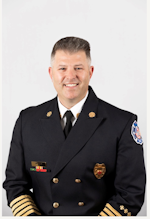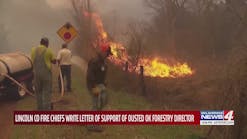Every head coach needs a philosophy that influences, engages and enacts a winning culture that contagiously, and courageously, improves accountability, growth and a championship-caliber mindset. Who doesn’t want to win? Who doesn’t want to build and develop a dynasty of greatness, led by grit, commitment and an “all in for each other” mentality? Even though sports and the fire service fall short of parallel comparison in a number of areas, building a winning dynasty as an organization is what leaders in the fire service, from firefighters to fire chiefs, should be all about.
What does it take to build a winning culture? What leadership traits propel the good to great, to exceptional, to an elite winning dynastic culture?
We can learn much about the simplicity of a winning culture from a few quotes from coaches in the sports world. These people hold the members of the team not only accountable for their actions on the field but also share a common expectation of how leaders enact necessary change to be better humans on and off the field.
Lombardi, Jackson & Lasorda
Widely recognized as one of the greatest coaches of all time, Vince Lombardi said, “Leaders are made, they are not born. They are made by hard effort, which is the price which all of us must pay to achieve any goal that is worthwhile.”
Phil Jackson, who never missed the playoffs as a head coach, said, “Always keep an open mind and a compassionate heart.”
The outspoken Tommy Lasorda said, “There are three types of baseball players: Those who make it happen, those who watch it happen and those who wonder what happens.”
Another quote that’s meaningful to me that I want to share is from a newer NFL head coach, DeMeco Ryans: “I think football should be played with passion, I think it should be played with energy, and I think, when you get the opportunity to do it, you should give everything you have to the game, because you don’t know when your last play will be.”
Let me, here, remark about leaders getting “on the field” and provide my insight on character, kindness and constancy to build a winning dynastic culture in the firehouse and the fire service and, most of all, for humanity’s sake. We set the tone. We enact necessary change. We lead.
Character: scorpion or frog?
I recently heard the fable of the “The Scorpion and the Frog.” Let me preface telling you the story by letting you know that frogs terrify me (and, yes, there are killer frogs out there), so for me to share a story about a frog, well, is courageous and vulnerable.
A scorpion wants to cross a river but can’t swim. The scorpion asks a frog to carry it across. The frog is afraid that the scorpion will sting it. The scorpion promises that it won’t. The frog asks, “How do I know you won’t kill me as I carry you?” The scorpion replies, “If I were to strike you, we would both surely die.” Thinking it over, the frog agrees, but halfway across the river, the scorpion strikes the frog in the back. As they both start to drown, the frog asks, “Why did you strike me? Now, we will both die.” The scorpion replies with his last breath, “It is my nature.”
The question that we all must ask ourselves as self-reflective leaders is, what is in the nature of our character? How are our qualities distinctive to our character? How many interview panels have you sat on when people described themselves in terms of their character as people who have high integrity and are hardworking and compassionate?
In the fire service, as public servants, trust is given to us by the people who we serve simply as a result of the patch that we wear over our heart, by the sight of a fire truck, by the sound of a siren. However, character not only defines who we are but what we do with who we say we are as a person, as a leader, as an officer. So, consider self-reflection and write down character-defining qualities that you believe that you possess, much as if you were answering a question that’s posed during an interview. Then, ask those people who are closest to you how they would describe your character.
This practice requires vulnerability and courage, trust and accountability, and openness with risk.
As leaders, we constantly should self-reflect to be better humans, stronger leaders and winning-culture creators. Members always look to us to set the tone on and off of the field to change the landscape for the people who we serve.
What do you want to be known for? Focus on the value of character instead of the value of perceived success.
Kindness and constancy
One of my head coach organizational principles and philosophies is “Be kind, be an ‘uncommon’ community.” From my lens, anyone can be common and even appear to be a community. What separates an authentic leader from the deceptive leader centers on humility, selflessness and a constant kindness in the most difficult situations, particularly when difficulty attempts to breed division and destruction. To be an “uncommon community” means that a team, being passionate about a winning culture, infuses compassion for others and constant kindness as an organizational ethos, to drive us to simply be different, do differently and serve differently. “Uncommon acts of kindness” (e.g., a caring conversation on the bumper of the truck or in a recliner next to a teammate) can be felt before, during and after a call. Being “uncommon” in the community means that we set the tone of change by treating people with compassion, selflessness and constant kindness, as we simply make their bad day better, the best that we can, with what we have. The power couple of kindness and constancy is what communities deserve and what leaders always must provide with their character, setting the tone of influence.
Respect & discipline
The Houston Oilers legendary coach, Bum Phillips, said, “Respect all. Fear none,” and “The only discipline that lasts is self-discipline.”

Dr. Brett Ellis
Dr. Brett Ellis is a 27-year veteran of the fire service and serves as the fire chief for the city of Webster Groves, MO. He holds a bachelor’s degree in fire administration from Western Illinois University, a master’s degree in leadership and adolescent development from Huntington University and a doctorate in education from Concordia University-Portland. As a consultant (AGILE Leadership Consulting Inc.), Ellis focuses on leadership, firefighter behavioral health, conflict resolution, officer development, organizational movement, relationship building and personnel role plays that are based on fire service lawsuits. As well, he teaches for the National Fire Academy and Columbia Southern University.






